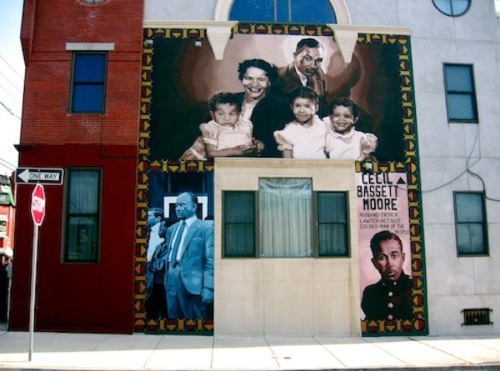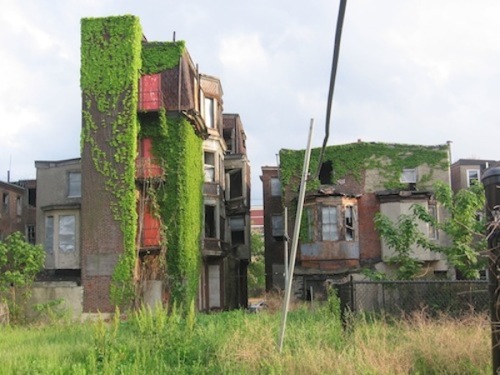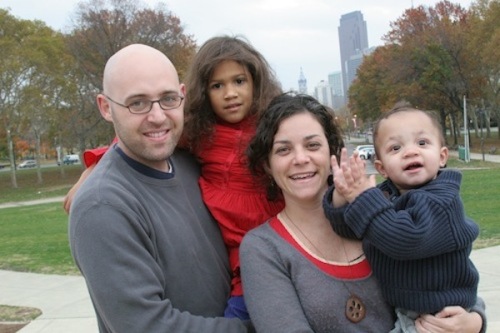In 2003 my husband and I decided to move up north with our three-year-old so that Dave could attend seminary. We left our small Americana town committed to a new idea of living in an urban setting. We felt that we would die of boredom if we stayed in Franklin, Tennessee. How could our lives have any eternal significance in a place of such homogeny and affluence? Finally, we were on our way to living The Life we’d always fantasized about. The city, any city that was charmingly distressed, was the only appropriate setting to live a life worthy of Oprah, er, Christ — feeding the homeless, advocating for social justice, living out the Biblical call to love the poor. We had boundless energy, and a life in the city seemed just the place to expend it.
We hammered down our roots through the concrete and tried to make Philadelphia our home. We sold our second car, purchased bicycles, and applied for food stamps. I relished in the multiculturalism and the three thousand or more murals covering the city walls. Themes of courage, personal renaissance, and heritage emanated through the broken walls of this city that would one day be restored.
 Photo: Sarah Braud
Photo: Sarah Braud
But daily living in the city was harder than I expected. I was in a foreign culture with no one to translate for me. I eavesdropped on conversations at the park and tried to fit in. Women with names like Maureen and Kathleen stood on the sidelines — their arms crossed — while their daughters took turns batting. Their faces were weathered and their hair limp and I wondered why they hated me. My hellos were viewed with hostile skepticism. I finally learned to keep smiles to myself. After months of assimilation, I ascertained that imposing my cheery greetings on others was culturally inappropriate.
I eventually made friends who were mostly transplants from the South, or young adults who grew up in the suburbs of Philly — people romanced by the city’s history, food, architecture, culture, and the grit. There is a pride about surviving in the City of Brotherly Shove. We swapped stories of muggings and fistfights, gunshots and middle-of-the-night domestic disputes — the collective culture of Philly. These experiences were our common ground and we reveled in telling our stories, which we believed made us belong. Once you knew how to hold your ground, how to shove and say, No, this is mine, then you belonged. What you owned was valued not by how much you paid for it, but by how much you lost in order to keep it.
After my third bike was stolen, Dave’s dad bought me a $15 beach cruiser. It was rickety and rusted and I was super proud. I had adopted the Philadelphian pride. The bike said, “Don’t f**k with me. I have lived here long enough to know that shiny things don’t last.” I would never have said the F-word in the South. But in Philadelphia, the word is a utility, like electricity. An indispensable part of speech.
 Photo: Sarah Braud
Photo: Sarah Braud
Dave and I were motivated to live in an urban setting by the Biblical call to love the poor. Isaiah 58 says that true religion is standing up for the oppressed, rebuilding broken walls, setting the captives free. That chapter has always been our guidepost as we make decisions for our family. Affluence insulates people from brokenness, and we do not want our children raised in a pain-proof environment. But we were conflicted. When Dave graduated, we were once again faced with the decision of where to make our home.
After five years of the city’s daily grind and the increase of family size — two small children — I felt pounded and bruised, but there was still an internal pull to stay. Some inner voice said that living in the city was more spiritual, more courageous, more something. Was living out the Christian life a call to choose the hardest path? Seeking out pain and suffering is Nihilism, not Christianity. So where is the line? The balance? Where should we make our home if Philadelphia wasn’t it? I was too tired to decide on anywhere else but Franklin.
 Photo: Sarah BraudI am charmed by my own stories of city life — the power of narrative is difficult to resist. Though we used food stamps along with everyone else on our block, we still had opportunities we didn’t have in Franklin. Images flash through my mind: figure-drawing classes at the Pennsylvania Academy of Fine Arts; Ellie at age 5 sketching Degas’ “Ballerina” during her art classes at the museum; my children handing out homemade cookies to the homeless who gathered on Washington Square on Friday nights; eating cheesesteaks from the Russian cart-man; eating udon noodles at Nam Phong; eating a slice of plain at Fairmount Pizza
Photo: Sarah BraudI am charmed by my own stories of city life — the power of narrative is difficult to resist. Though we used food stamps along with everyone else on our block, we still had opportunities we didn’t have in Franklin. Images flash through my mind: figure-drawing classes at the Pennsylvania Academy of Fine Arts; Ellie at age 5 sketching Degas’ “Ballerina” during her art classes at the museum; my children handing out homemade cookies to the homeless who gathered on Washington Square on Friday nights; eating cheesesteaks from the Russian cart-man; eating udon noodles at Nam Phong; eating a slice of plain at Fairmount Pizza
. . . lots of eating.
It all sounds charmingly cultured and enlightened, but that is before I remind myself of the eight rounds of lice we battled in the two years Ellie was in school. Or how our housemates wondered if our infant gave their dog ringworm, rather than the other way around. Or when a mouse actually nipped the tip of my nose while I slept. There were also the daily rounds we spent fighting for parking spaces, fighting parking tickets, fighting rodent infestations, fighting to sleep while the neighbors were fighting . . . lots of fighting.
Then there is the story about the corner drug dealer who walked Atticus home after he escaped out our front door. Atticus was two years old and naked and went looking for his Papa after bath time. The dealer who sold “pancakes and syrup” — a mixture of a barbiturate and codeine cough syrup that made our block at 17th and Jefferson one of the top-five most notorious spots in Philly — knew exactly where to return Atticus, calling him “Little Man” and shepherding him up the sidewalk to my stoop. Once when I was unloading groceries from my car, he offered to help. He also offered me xanies, which I politely declined. I didn’t know that a doctor would later prescribe Xanax for my panic attacks, pills that cost me at least twice as much as I could have purchased on my block.
I’d hear “Living on a Prayer” on my car radio at least twice a day. I never understood the obsession with Bon Jovi. “We’ve got to hold on, ready or not,” Bon Jovi sang. “You live for the fight when that’s all that you’ve got!” I’d listen to those lyrics, people blaring their horns in my direction, and wonder how that could be enough for anyone. Living for the fight just made me want to go back to bed.
The night before we moved back to Franklin, Dave put four stools out on the road to save a parking space for the moving van. He’d tied the stools together with one long piece of duct tape. The next morning, I waited in the house with the door open while Dave took the kids to pick up a 26-foot U-Haul truck. I was still sorting and packing last-minute boxes, deciding what to throw out, what to give away. I set a few plastic toys on the sidewalk, knowing someone would want them, along with a Pack-n-Play, a box of books, and some kitchen items.
One man, who had ridden his bike by earlier that morning and had ridden away with a coffee maker balanced on his handlebars, came back every hour to see if we’d put out anything else. He was looking for a hose, he’d said. He’d also asked about the stools, were they for sale? No, we’d told him, they actually were staying with the house.
As I sat in my empty living room, I heard a loud metal scraping sound, as if something was being drug along the cement. By the time I reached the front door, all four stools were gone. I tried to imagine how the man on the bike was able to carry all four stools, but I knew it was him. Angry, I stalked down the street, insistent on retrieving what now belonged to the new owners of 1413. I turned left onto Master, trotted across the street to 17th, and made a right. I walked directly up to a stand-alone storage unit I knew this man had been squatting in.
The garage door was almost always open, and the space inside was filled with trashed-picked items that he would sell from his corner. We all knew he lived there illegally, but what was it to us?
With my cell phone up to my ear, I walked right up to the man. I stated that he needed to return the stools. He jumped up and began stacking the stools. I turned and continued my conversation on the phone as he stumbled behind me on his oversized shoes, all the while asking if my husband was going to kill him. On the day I left Philly, I had finally learned how to claim my space, my part of the city. I had fought for it, and I won.
 Photo: Coury Deeb
Photo: Coury Deeb
When we returned last summer for a week-long holiday, we drove along Kelly Drive, the road beside the Schuylkill River. I recalled the first week we moved to Philadelphia. I had said to Dave, “I hope I never get used to Kelly Drive.” The river’s name loosely translates from Dutch as “hidden river.” Rows of cherry trees in full bloom line the grassy banks of the rock-walled river; people of all colors exercise on the trail that runs alongside the river; the row teams are usually out practicing; the statue garden; and the imposing sycamore trees that garrison the river with their regally-ancient, peeling bark. Approaching Boathouse Row, I pointed out an area where we used to watch people dance on roller skates to music from a boom box. My son pointed to a scene from his own memory, “Look! That’s where we saw the dead dog floating in the river!” I never did get used to Philadelphia with its brokenness and beauty crowded together so close that the beauty was often hidden in its shadows.
When we moved away from Franklin, I said we’d never be able to return to such a small town with its small thoughts, but that was before I was so tired. I still wrestle with feeling like I sold out. I still don't know exactly how to live out the Isaiah 58 call in a small-town context. It's not as clear. The real dramatic, tension-filled moments of triumph or defeat are not as visible. Here, the beauty and affluence shadow the brokenness. Hidden underneath the honeysuckle bushes and the front porches, you’ll find racial and economic inequality. Behind the white picket fences and manicured lawns, an all-consuming fear is hushed with consumerism and gluttony.
Like the Schuylkill, the river running through the middle of Franklin is hidden. In fact, it’s been fairly neglected. Its name, the Harpeth, is said to have come from legendary outlaw brothers, Big Harp and Little Harp. Not quite the hidden gem that the Schuylkill River is in Philadelphia. Though they’d certainly feel the pull of free parking, most Philadelphians would hate living in Tennessee. The quiet, the syrupy greetings, the small town gossip, and the crickets would unnerve them. Yes, this shire has its own version of brokenness and adventure with which I must contend. But I love it. Franklin is my home.
Sarah Braud lives in Franklin, Tennessee, with photographer David Braud and their two beautiful children, Ellie and Atticus. Sarah is an ESL teacher at Vanderbilt University and is currently working on her MFA in creative writing at Vermont College of Fine Arts. You can read more of Sarah's writing at www.sarahsjunipertree.blogspot.com.














